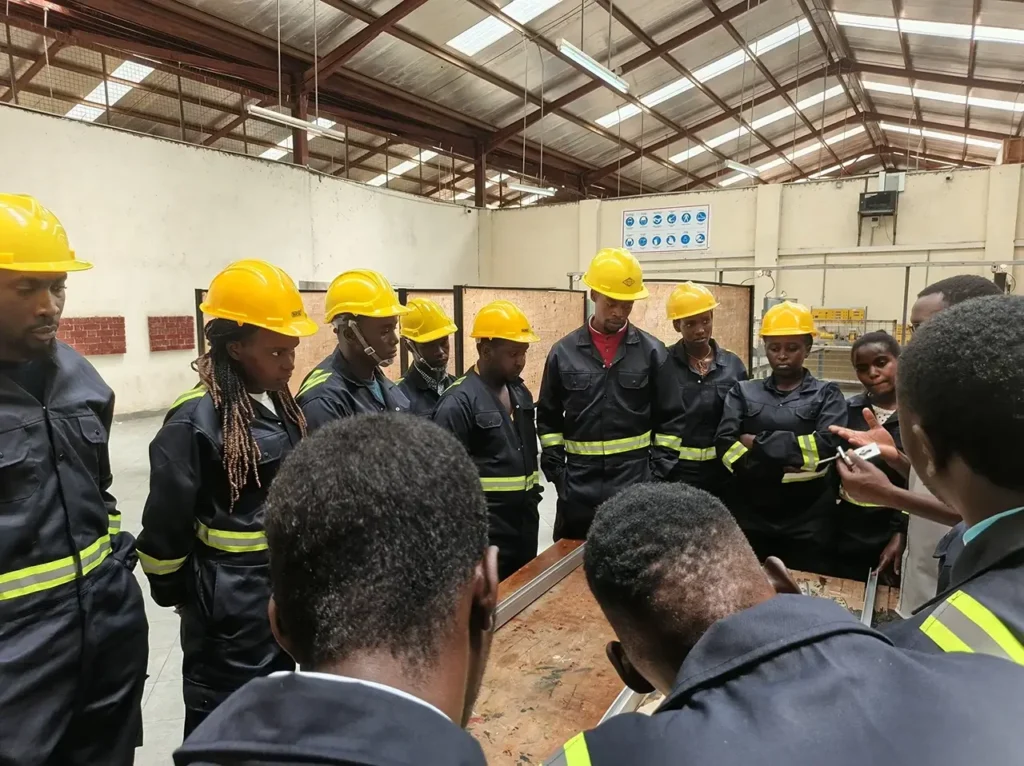Nowadays, searching after real-world skills for building a sustainable career has become a necessity and the evolvement of the job market has proved that there are different routes to achieving that. Traditional academic routes are no longer the only way. As apprenticeships has been rising as dynamic options.
Apprenticeships provide a combination of hands-on experienced with structured learning, that empowering individuals with real-world and demanding skills. At WTS Foundation, our mission is to connect youth with lasting careers in the energy transition at every step of the way; consequently, apprenticeships are at the heart of this mission.
What is an apprenticeship?
Apprenticeships are structured training programs. They take classroom instruction and combine that with practical and on-the-job learning. Apprenticeships are not to be mistaken for internships, because internships are often short-term and sometimes unpaid. While apprenticeships consist of formal agreements between an employer and an apprentice. The period of apprenticeships can be anywhere from one to four years. During this period, the apprentices work under the structured guidance of experienced mentor(s), allowing them to acquire specialized skills and at the same time earning a wage.
From an historical perspective, apprenticeships were common in crafts and trades, such as carpentry, masonry, or blacksmithing. Nonetheless, nowadays, apprenticeships have evolved and expanded into many other sectors including renewable energy, technology, healthcare and hospitality. The essence has remained the same, until now, apprenticeships continue to prepare individuals by combining theoretical knowledge with practical expertise.
In short, during the time of apprenticeships, the apprentice:
- Enters in a work relationship with the employer
- The period of apprenticeships is paid
- Works under the guidance of experienced mentors
- Gains practical and technical skills on the job
- Receives industry-recognized certification upon completion
How does an apprenticeship work?
Apprenticeships can be seen as a partnership, a work employment relationship; where the apprentice embarks on a journey of learning, guided by a mentor within an organization. The end goal of the partnership is to turn the apprentice into a highly skilled employee; therefore, the organization invest time in the apprentice’s development and nurture the relationship.
Since apprenticeships consist of formal agreements between an employer and an apprentice, it follows the normal steps of employment, such as:
- Recruitment & Selection: employers advertise apprenticeship opportunities, outlining the necessary skills and qualifications required. Aspiring apprentices submit their application, and follow the selection process, which often includes multiple rounds of interviews and tests, to ensure a good fit.
- Employment Contract: once accepted, the apprentices sign an employment agreement with the employer. The agreement outlines the duration, wage, training plan, and expectations.
- Training & Assessment: the period of the apprenticeships is often split between productive work and formal learning. The formal learning may take place at a vocational school, community college, or online platform, where progress is monitored through regular evaluations and assessments.
- Certification & Progression: upon successful completion, the apprentices receive certification, which are recognized by industry bodies or government authorities.
This structured approach of learning by doing is what makes apprenticeships successful, turning the apprentices into contributors, problem-solvers, and ultimately, future managers.
Industries That Offer Apprenticeships
Apprenticeships have expanded into different sector today, including:
- Renewable Energy: the world is transitioning to cleaner energy solutions, consequently, we have seen a rise in apprenticeships in solar installation, wind technology, battery storage, and green building systems. These technical courses aim at equipping individuals with practical skills, especially across East Africa, where renewable energy is key to expanding access and driving economic resilience.
- Construction & Engineering: roles like electrician, plumber, civil engineer, and architect are also benefiting from apprenticeships. Independently from the technical skills, the apprentices are exposed to crucial safety standards and project management.
- Information Technology: the technological world has evolved with the rise of AI and automation; in this sector, apprenticeships offer hands-on learning into software development, cybersecurity, network engineering, and data analysis.
- Healthcare: nurses, dental assistants, pharmacy technicians, and even medical technologists are also starting their careers through apprenticeship routes, gaining valuable clinical experience alongside their studies.
- Hospitality & Culinary Arts: chefs, hotel managers, and event coordinators are benefiting from structured programs, teaching them, both customer service and business operations.
- Financial Services: banking, insurance, and accounting firms are increasingly using apprenticeships to train analysts, advisors, and clerks, combining theory with real client case studies.
- Manufacturing & Automotive: mechanics, machinists, and production supervisors are gaining practical skills in advanced facilities.
- Creative Industries: media production, graphic design, and digital marketing agencies are also providing apprenticeships, allowing creative minds to develop portfolios as they learn.
From the above summary, we understand that apprenticeships are very diverse and are no longer limited to historical manual trades. Whether you aspire to start your career in renewable energy, healthcare, hospitality, or construction, there is possibly an apprenticeship ready to guide your steps and ambition.
Benefits of apprenticeships
Whether you are an individual seeking a career path or an employer aiming to build a skilled team, apprenticeships have proven advantages:
For apprentices:
- Earn While You Learn: unlike many university programs or internships, apprenticeships offer a paid employment. Apprentices are then able to support themselves financially, while sometimes still studying.
- Real-World Experience: apprentices gain valuable insight into the daily realities of their chosen profession. Studies have shown that this practical knowledge often leads to higher job satisfaction and lasting career prospects.
- Industry-Recognized Credentials: accredited apprenticeships with recognized qualifications, open doors to further advancement or specialization.
- Networking Opportunities: apprentices build relationships with mentors, colleagues, and industry leaders, laying the foundation for a professional network.
- Enhanced Employability: many employers prefer hiring those with proven experience, and apprenticeships provide just that. In fact, studies shown that a high percentage of apprentices receive a permanent job offer from their employer of apprenticeships upon completion.
- Personal Growth: beyond technical skills, apprenticeships develop soft skills such as communication, teamwork, and adaptability, qualities that are critical in any field.
For employers:
- Opportunity to build a loyal and skilled workforce
- Address talent gaps in your industry
- Reduce hiring and onboarding costs
- Shape employees to fit organizational culture
- Improve retention and innovation

Apprenticeships in East Africa
Across East Africa, apprenticeships are playing a critical role in addressing youth unemployment, skills shortages, and economic inequality; a mission that WTS Foundation is proud to be part of. In countries like Kenya, Uganda, Tanzania, and Rwanda; governments and private organizations are prioritizing apprenticeship programs to support evolving sectors and providing young people with the tools needed to thrive.
Some of the evolving sectors include:
- Renewable Energy
- Agribusiness
- Information & Communication Technology (ICT)
- Construction & Infrastructure
- Tourism and Hospitality
However, challenges such as limited access, funding, and coordination between schools and industries remain significant and the need for stronger partnerships between training institutions and employers is indispensable.
Therefore, at WTS Foundation, we are committed to:
- Develop and deliver training in renewable energy.
- Establish knowledge hubs for technology and skills.
- Foster engaged communities
- Expand access to quality apprenticeship programs
- Build bridges between employers and training institutions
Success stories from our initiatives include youth and women entering the renewable industry, and graduates driving innovation in local communities. Hence, we work closely with stakeholders to expand access to quality apprenticeship programs, promote best practices, and ensure that both apprentices and employers are set up for success.





